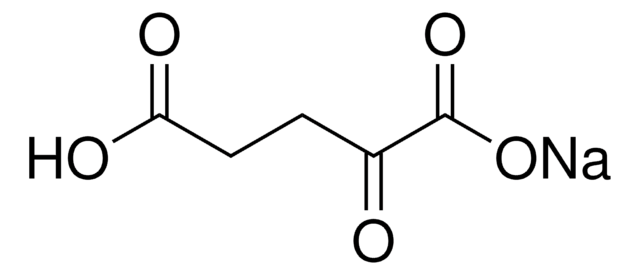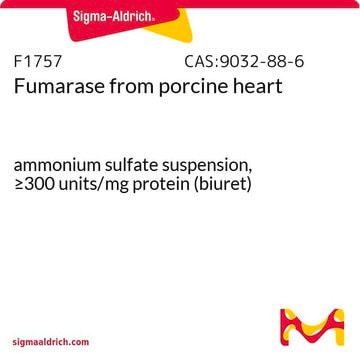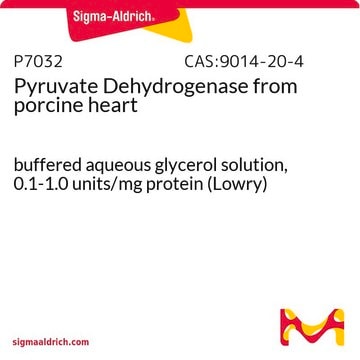K1502
α-Ketoglutarate Dehydrogenase from porcine heart
buffered aqueous glycerol solution, 0.1-1.0 units/mg protein (Lowry)
Synonim(y):
Multienzyme 2-oxoglutarate dehydrogenase complex
About This Item
Polecane produkty
Postać
buffered aqueous glycerol solution
aktywność właściwa
0.1-1.0 units/mg protein (Lowry)
obecność zanieczyszczeń
pyruvate dehydrogenase ≤20%
Warunki transportu
dry ice
temp. przechowywania
−20°C
Szukasz podobnych produktów? Odwiedź Przewodnik dotyczący porównywania produktów
Opis ogólny
α-Ketoglutarate dehydrogenase (α-KGDH) is a multienzyme complex localized to the mitochondria. This integrated enzyme is made up of many units of thiamine pyrophosphate-dependent dehydrogenase (E1), dihydrolipoamide dehydrogenase (E3), and dihydrolipoamide succinyl transferase (E2).
Zastosowanie
- to study the reversal of nitration by glutathione (GSH) in peroxynitrite-treated cells
- to measure its activity by Spectramax M5 microplate spectrofluorimeter using heart mitochondria
- as a positive control to evaluate its activity in by Spectramax GEMINI EM fluorescence microplate reader using mice neurons
Działania biochem./fizjol.
Jakość
Definicja jednostki
Postać fizyczna
Informacje prawne
Zwroty wskazujące rodzaj zagrożenia
Zwroty wskazujące środki ostrożności
Klasyfikacja zagrożeń
Aquatic Chronic 3
Kod klasy składowania
10 - Combustible liquids
Klasa zagrożenia wodnego (WGK)
WGK 1
Temperatura zapłonu (°F)
Not applicable
Temperatura zapłonu (°C)
Not applicable
Środki ochrony indywidualnej
Eyeshields, Gloves, multi-purpose combination respirator cartridge (US)
Certyfikaty analizy (CoA)
Poszukaj Certyfikaty analizy (CoA), wpisując numer partii/serii produktów. Numery serii i partii można znaleźć na etykiecie produktu po słowach „seria” lub „partia”.
Masz już ten produkt?
Dokumenty związane z niedawno zakupionymi produktami zostały zamieszczone w Bibliotece dokumentów.
Klienci oglądali również te produkty
Nasz zespół naukowców ma doświadczenie we wszystkich obszarach badań, w tym w naukach przyrodniczych, materiałoznawstwie, syntezie chemicznej, chromatografii, analityce i wielu innych dziedzinach.
Skontaktuj się z zespołem ds. pomocy technicznej











